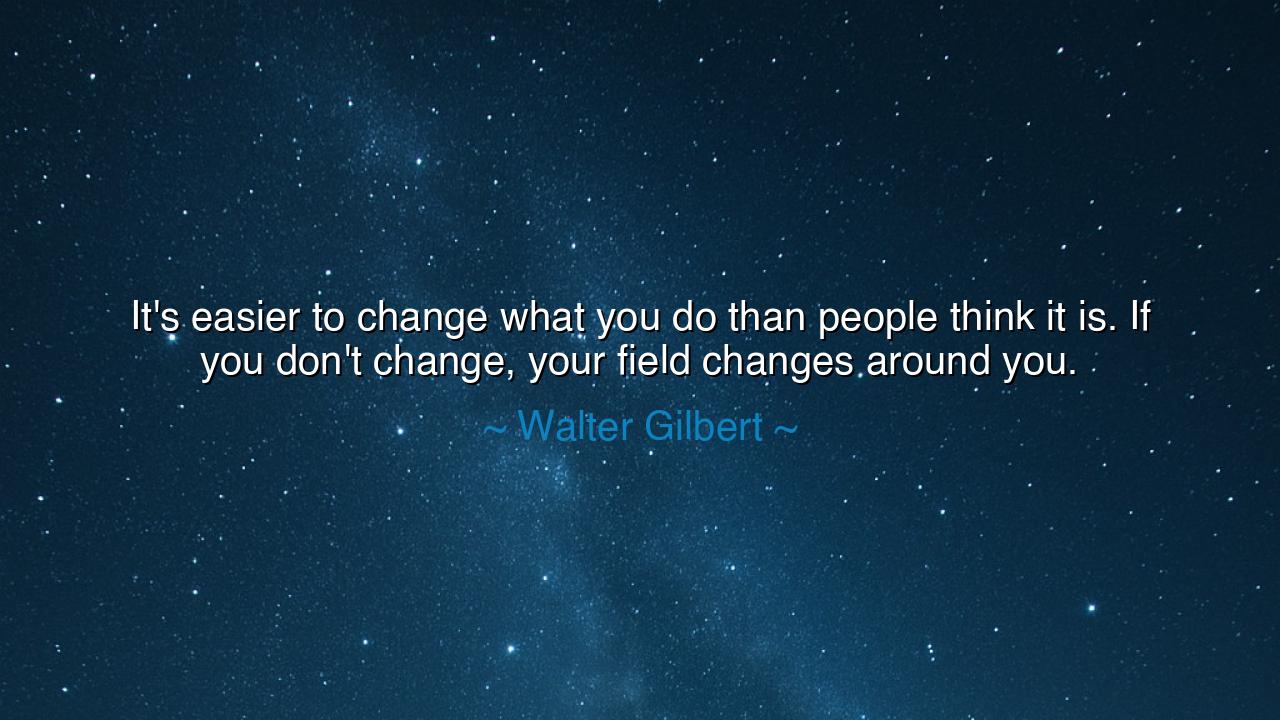
It's easier to change what you do than people think it is. If
It's easier to change what you do than people think it is. If you don't change, your field changes around you.






Hear the wisdom of Walter Gilbert, seeker of knowledge and pioneer of discovery, who declared: “It’s easier to change what you do than people think it is. If you don’t change, your field changes around you.” In this teaching lies the eternal law of transformation—that life is never still, and he who clings to old ways shall be left behind by the march of progress.
To change what you do is not the impossible burden that fear makes it appear. The mind, though stubborn, is supple; the spirit, though cautious, is capable of renewal. Gilbert reminds us that change, when embraced, brings with it freedom, for the chains of habit fall away and new paths open before the willing heart. The ancient river does not resist its course, but bends and flows, shaping mountains and carving valleys as it goes.
Yet he warns with equal strength: if you do not change, the world will not wait for you. The field changes around you, whether you will it or not. Time advances, knowledge expands, and those who remain unmoved awaken one day to find themselves strangers in their own land. What was once mastery becomes obsolescence; what was once secure becomes fragile.
This saying arises from Gilbert’s own world, the realm of science, where discovery is relentless and truth ever-unfolding. He knew that survival in such a field demanded humility, adaptability, and courage—the willingness to learn anew and abandon what no longer serves. Yet his words reach beyond science, touching all who labor in life: farmer, builder, artist, leader. For all must face the tide of change.
Thus let the teaching be remembered: do not fear change, but embrace it as ally and teacher. For to change willingly is to grow, but to resist is to wither. The wise do not stand still while the world shifts beneath them; they move, they adapt, they rise. This is the path of endurance, the path of victory, the path Gilbert sets before us—an ancient truth clothed in modern words.






LNnguyen thi lan nguyen
This quote really resonates with me, but I wonder how often people find themselves stuck because they’re not sure how to initiate change. Is it truly easy to change what we do, or do we make it harder than it has to be? How can we build the mindset and strategies to be proactive in changing our own behavior, especially when everything around us is constantly shifting?
HVHa Vu
I agree with the idea that change can be easier than we think, but it also raises questions about adaptability. If we don’t change, how do we avoid being left behind as the world evolves around us? Are we doomed to watch as others move forward while we stand still? How do we embrace change in a way that benefits us, rather than feeling overwhelmed by it?
TDTrung Dung
Walter Gilbert's point about change makes me wonder, is it really easier to change our actions than we think, or are we simply not aware of the barriers we face? Often, it’s the small, consistent changes that make the biggest difference. But how do we stay motivated to change when the world seems to move faster than we can keep up? How do we take the first step when change feels daunting?
DDDieu Doan
This quote is a powerful reminder of how change isn’t always as hard as we make it out to be. But is it possible that we resist change because we’re afraid of what it means for our identity? When the world around us evolves, how do we balance adapting to new realities with staying true to ourselves? What does it take to change effectively without losing our core values?
TNTuyet Nguyen
Walter Gilbert’s quote offers an interesting perspective on the ease of change. It makes me think – why do we often resist change when it can be so simple? Is it fear of the unknown or the comfort of the status quo that holds us back? How often do we allow ourselves to be dragged along by changes in our environment, rather than taking control and adapting proactively?